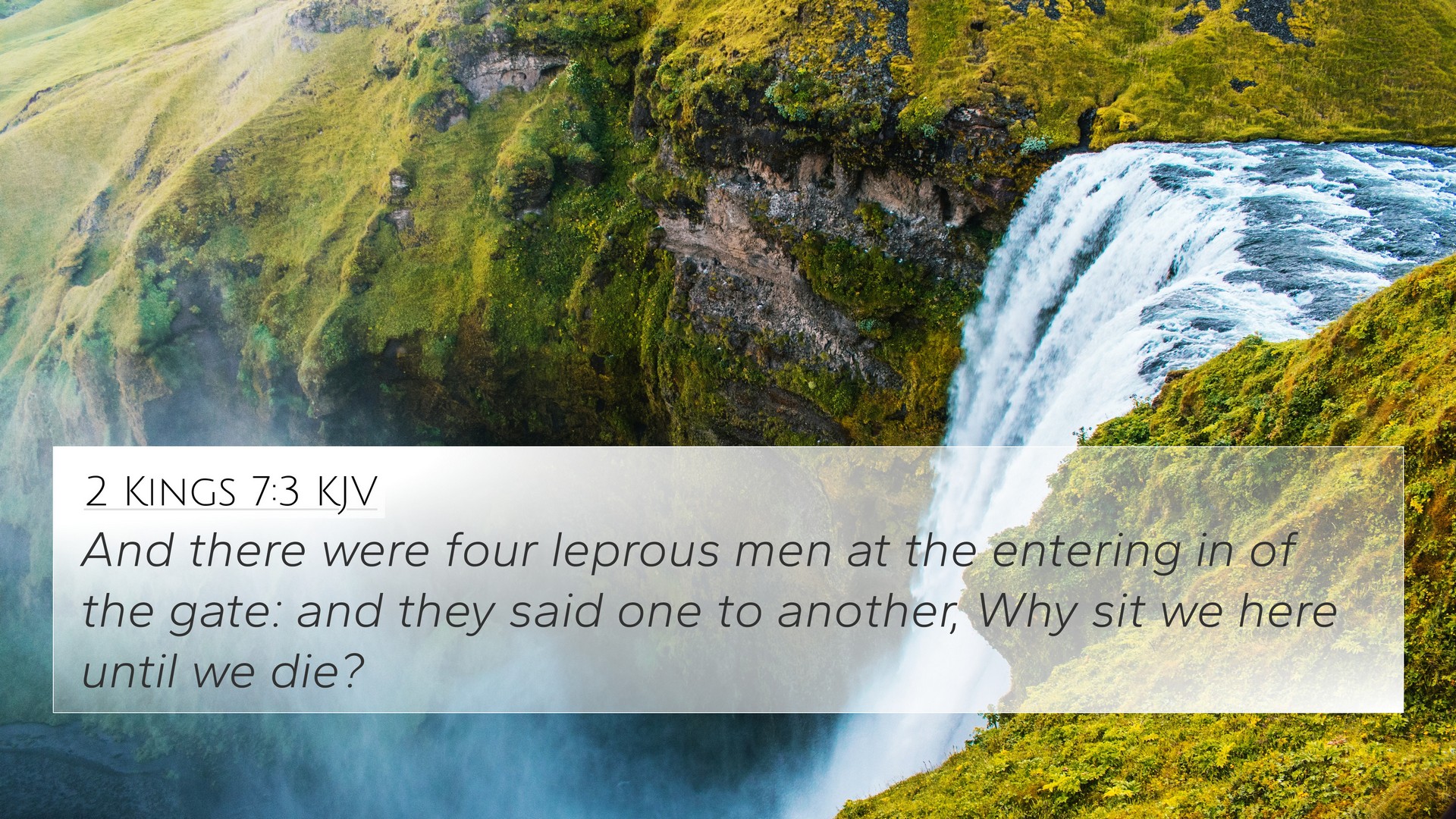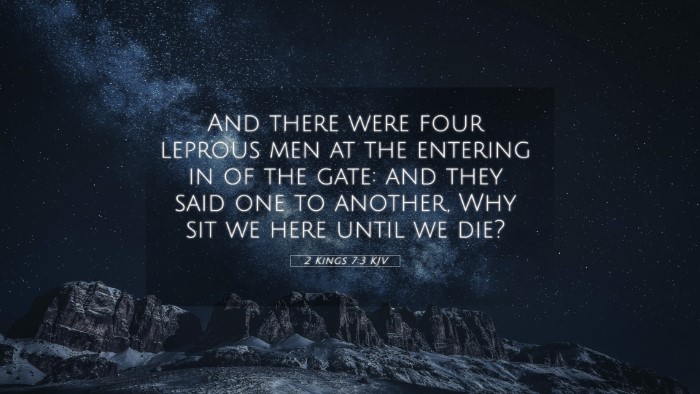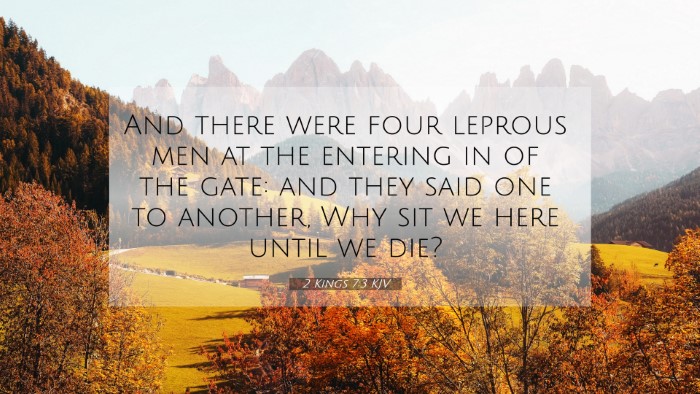Old Testament
Genesis Exodus Leviticus Numbers Deuteronomy Joshua Judges Ruth 1 Samuel 2 Samuel 1 Kings 2 Kings 1 Chronicles 2 Chronicles Ezra Nehemiah Esther Job Psalms Proverbs Ecclesiastes Song of Solomon Isaiah Jeremiah Lamentations Ezekiel Daniel Hosea Joel Amos Obadiah Jonah Micah Nahum Habakkuk Zephaniah Haggai Zechariah Malachi2 Kings 7:3 Similar Verses
2 Kings 7:3 Cross References
And there were four leprous men at the entering in of the gate: and they said one to another, Why sit we here until we die?
Uncover the Rich Themes and Topics of This Bible Verse
Listed below are the Bible themes associated with 2 Kings 7:3. We invite you to explore each theme to gain deeper insights into the Scriptures.
2 Kings 7:3 Cross Reference Verses
This section features a detailed cross-reference designed to enrich your understanding of the Scriptures. Below, you will find carefully selected verses that echo the themes and teachings related to 2 Kings 7:3 KJV. Click on any image to explore detailed analyses of related Bible verses and uncover deeper theological insights.
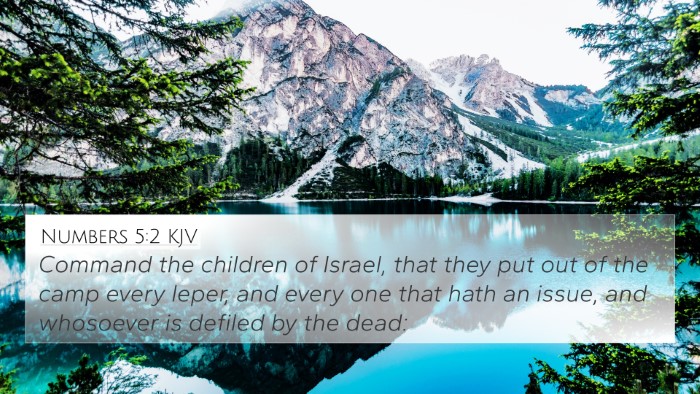
Numbers 5:2 (KJV) »
Command the children of Israel, that they put out of the camp every leper, and every one that hath an issue, and whosoever is defiled by the dead:
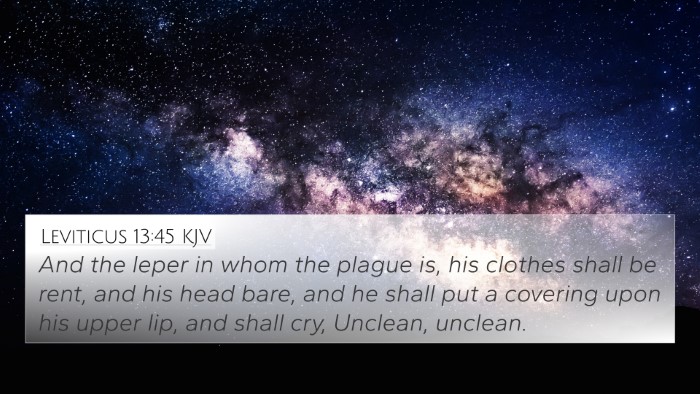
Leviticus 13:45 (KJV) »
And the leper in whom the plague is, his clothes shall be rent, and his head bare, and he shall put a covering upon his upper lip, and shall cry, Unclean, unclean.
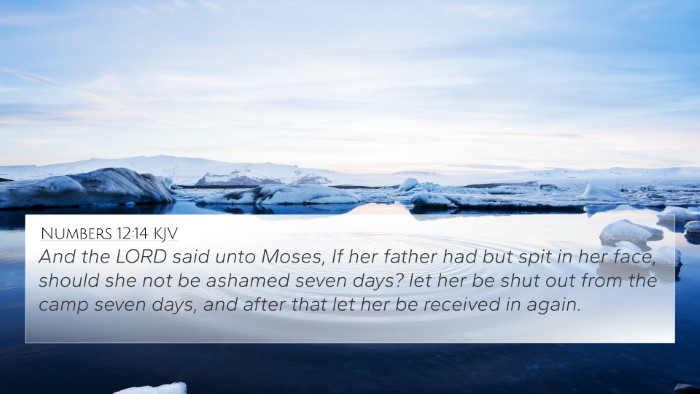
Numbers 12:14 (KJV) »
And the LORD said unto Moses, If her father had but spit in her face, should she not be ashamed seven days? let her be shut out from the camp seven days, and after that let her be received in again.
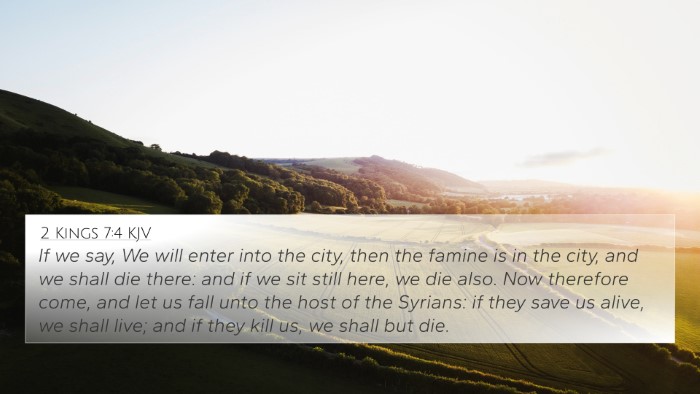
2 Kings 7:4 (KJV) »
If we say, We will enter into the city, then the famine is in the city, and we shall die there: and if we sit still here, we die also. Now therefore come, and let us fall unto the host of the Syrians: if they save us alive, we shall live; and if they kill us, we shall but die.

2 Kings 8:4 (KJV) »
And the king talked with Gehazi the servant of the man of God, saying, Tell me, I pray thee, all the great things that Elisha hath done.
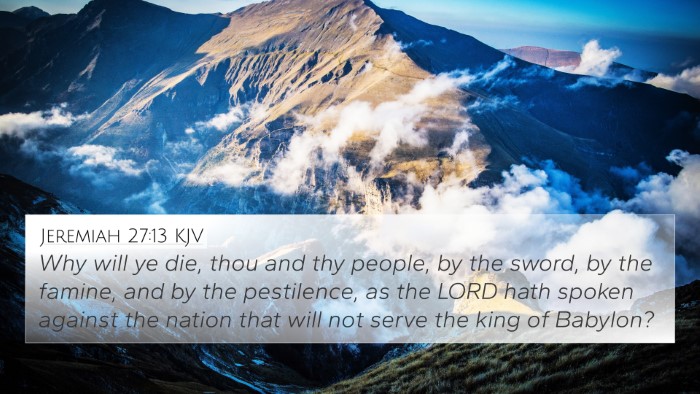
Jeremiah 27:13 (KJV) »
Why will ye die, thou and thy people, by the sword, by the famine, and by the pestilence, as the LORD hath spoken against the nation that will not serve the king of Babylon?
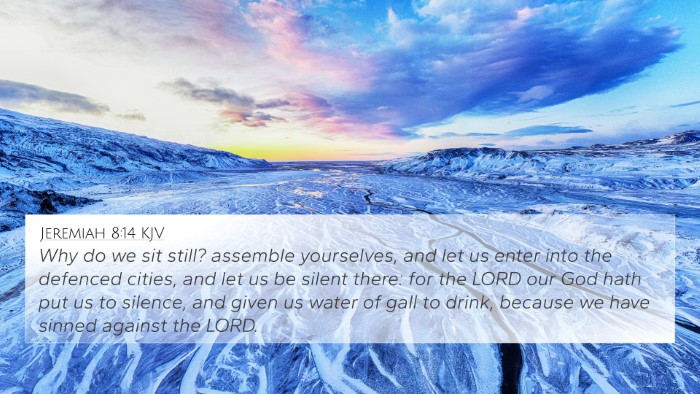
Jeremiah 8:14 (KJV) »
Why do we sit still? assemble yourselves, and let us enter into the defenced cities, and let us be silent there: for the LORD our God hath put us to silence, and given us water of gall to drink, because we have sinned against the LORD.
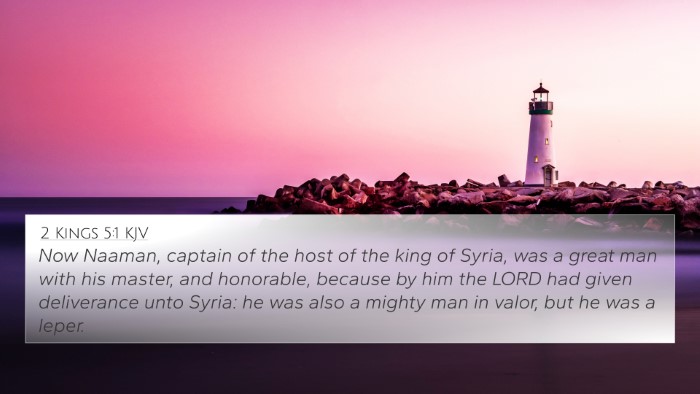
2 Kings 5:1 (KJV) »
Now Naaman, captain of the host of the king of Syria, was a great man with his master, and honorable, because by him the LORD had given deliverance unto Syria: he was also a mighty man in valor, but he was a leper.
2 Kings 7:3 Verse Analysis and Similar Verses
Understanding 2 Kings 7:3: A Deep Dive into Its Meaning
2 Kings 7:3 states: "And there were four leprous men at the entering in of the gate: and they said one to another, Why sit we here until we die?" This verse serves as a profound entry point into the themes of desperation, action, and divine deliverance found throughout the Scriptures. Below, we explore its meaning through various public domain commentaries, offering comprehensive insights and cross-references that illustrate its significance.
Contextual Background
The context of this verse lies during a severe famine in Samaria, the capital of Israel, where the people were in a desperate situation. The four leprous men were not only afflicted by their disease but also marginalized by society, as leprosy rendered them outcasts. Their situation prompts them to consider their fate and communicate their dilemma, marking a critical moment in the narrative.
Commentary Insights
- Matthew Henry's Commentary:
Henry emphasizes the desperate condition of the lepers and their rationale for taking action instead of passively waiting for death. Their decision to enter the enemy camp reflects a moment of courage and faith, suggesting that often, opportunities for deliverance arise in dire circumstances.
- Albert Barnes' Notes:
Barnes focuses on the leprous men's discussions, highlighting their sense of urgency. He notes that their leprosy symbolizes sin and separation from God. This symbolizes humanity’s need to seek help from God’s grace, particularly when all seems lost.
- Adam Clarke's Commentary:
Clarke presents an analysis of the social implications of the lepers' actions. He points to their collective decision-making as a form of survival instinct, showcasing the importance of community even in the face of dire circumstances. He also stresses the fundamental human desire for life and hope, which propels them to act.
Thematic Considerations
This verse opens discussions on various biblical themes, such as faith during adversity, the quest for survival, and the interplay of divine providence and human action. It invites the reader to reflect on how faith can lead to unexpected divine intervention.
Bible Verse Cross-References
The following verses relate thematically and contextually to 2 Kings 7:3:
- 2 Kings 6:25: Describes the famine that sets up the dire situation.
- Isaiah 64:6: Reflects on the condition of humanity, akin to leprosy.
- Matthew 15:27: Highlights the worthiness of those marginalized by society.
- Mark 5:27-28: The healing of the woman with an issue of blood, emphasizing faith.
- Luke 17:12-14: Jesus heals ten lepers, showing compassion for the outcast.
- John 4:29: The woman at the well who brings others to Christ, reflecting boldness.
- Hebrews 11:6: Emphasizes the importance of faith in pleasing God.
- James 2:26: The call to action that accompanies genuine faith.
- Romans 8:31: Reassures believers that God is for us, hence nothing can stand against us.
- Psalm 34:18: Assures the brokenhearted of God's nearness, paralleling the plight of the lepers.
Connecting the Themes
2 Kings 7:3 underscores the importance of recognizing moments when divine providence calls for action. The lepers' decision to approach the enemy's camp speaks to the broader biblical narrative where individuals step out in faith, leading to miraculous outcomes. For instance, along with Hebrews 11:6 and James 2:26, they convey the synergy between faith and action, underscoring that belief alone is insufficient without taking tangible steps toward the promise of God.
Practical Implications
For modern readers, the lessons from 2 Kings 7:3 can be applied in daily life. The lepers exemplify how to confront overwhelming challenges. Their story is a reminder that waiting idly in despair often leads to stagnation. Instead, moving forward—be it through prayer, seeking counsel, or taking steps toward healing or improvement—is vital. Furthermore, it encourages cross-referencing biblical texts to discover rich theological insights that can aid in understanding and application.
How to Use Bible Cross-References
Utilizing tools for Bible cross-referencing can deepen comprehension. Here are some methods to effectively engage with Scripture:
- Bible Concordance: Use a concordance to find words or themes that tie into 2 Kings 7:3.
- Bible Cross-Reference Guide: Utilize guides to navigate through connected scriptures.
- Cross-Reference Bible Study: Engage in studying groups where cross-references are discussed socially.
- Comprehensive Bible Cross-Reference Materials: Invest in resources that provide extensive cross-references for deeper studies.
Further Reflection
As you explore 2 Kings 7:3 and its surrounding narrative, consider the broader context of other biblical accounts that reflect similar themes of hope arising from despair. Reflect on how God often works through unexpected means to deliver His people, transforming desperate moments into opportunities for faith-driven actions.
Conclusion
In interpreting 2 Kings 7:3, the call for action from a place of desperation resonates throughout Scripture. It serves as a powerful reminder of the intersection of faith and life. By utilizing cross-referencing techniques, believers can uncover richer meanings and better understand God's overarching narrative in their lives.
